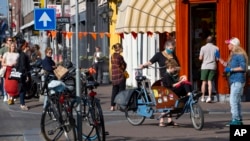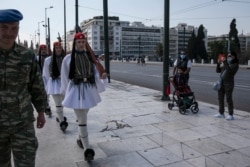Europe’s tourism sector has lost out on weeks of revenue because of the coronavirus lockdown. Now that countries are planning to gradually reopen, potential tourists are facing different rules and safety guidelines across the continent.
Jan Nak is newly retired and was planning to camp around Portugal for the month of May with his wife. But due to the coronavirus, the Dutch couple opted to rent a summerhouse in the Netherlands instead.
“As we didn’t get ill up until now, and my wife is still working, we said OK, we don’t take any risk and we stay in the Netherlands. And if you travel, you are a danger for another person as well. So, we didn’t want to endanger other people, and [wanted] to protect ourselves. We said, ‘If we can’t go this year, we go next year.’”
Southern and Mediterranean European countries attract millions of tourists like Nak and his wife each year.
One of the most popular camping destinations is France. But that country closed all its camping sites on March 17, and the sites are losing out on the profitable spring season, when they usually make about a third of their yearly revenue.
Ge Kusters is the vice president of the French campsite union and manages a camp site in the popular Dordogne area in southwestern France. This region with castles, caves and historical sites attracts more than three million tourists each year.
Normally, Kusters would now be welcoming some of the estimated 10,000 people who visit the site each year. But these days, he is working on a detailed plan on how to safely reopen the grounds.
“The size of a campsite is in acres, not in square meters, so there's no problem of having distance between the people," he said. "For the toilet blocks it's more about hygiene and special rules but that’s not too problematic. I think that in terms of animation that will change also a lot. The big events with concerts and so, that's probably finished. So, we have to adapt ourselves to a new way of entertaining people.”
Although Britons, Germans and Dutch make up about 40 percent of visitors to France, the others are French nationals. Because of the coronavirus, many people prefer a vacation closer to home to feel safer, but also because each country has its own rules.
France and Italy are planning to slowly reopen but won’t allow regional border crossings for now. Germany warns people against foreign travel although Austria hopes to attract German tourists.
Greece, a country that depends on tourism for 20 percent of its GDP, is considering only allowing in tourists who can prove they are not suffering from COVID-19 and have a so-called health passport.
The different guidelines will make it difficult not only for intra-European travel, but also for travelers from outside the continent. A partial lifting of the lockdown will not work, says Tom Jenkins, CEO of the European Tourism Association.
“That they're going to be lifted piecemeal, and in a different way, is of concern. The whole industry as it stands as of March 2020 is geared toward looking after people in real volume with numbers. And if the precondition of any movement is that volume is heavily restricted, then the businesses won't function,” he said.
The EU Commission is considering boosting the tourism industry by investing money from the EU budget. The sector accounts for 10 percent of the bloc’s GDP, and more than 27 million people work in tourism-related jobs.







